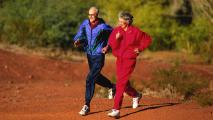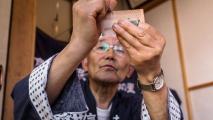Biggest science prize in history aims to extend human healthspan by a decade
Do humans have a biological or moral obligation to die young? Of course, “young” is subjective. Greenland sharks often live to be centuries old in good health. Until the 1900s, the human life expectancy was 31, including deaths at birth and a plethora of infectious diseases throughout life. Today, it’s 74 — and some calculate it’s increasing by 3 months for every year one stays alive. Yet the average healthspan — the number of years we live in good health — hasn’t fully kept up with the recent increase in average years lived.
Americans typically record a 12-year gap between healthspan and life expectancy, and the costs of this healthspan gap are disheartening. Today, some 40 million people in the United States — predominantly women — are unpaid caretakers of millions of older adults in declining health. By 2029, America will spend $3 trillion dollars yearly (half its federal budget) on adults aged 65 or older. Developing countries like Brazil, where the population of adults aged over 65 will triple by 2050, are getting old before getting rich.
For all our progress, we have made only decent headway in extending the human healthspan in the absence of disease. Compared to our progress in transcending nature through, say, heavier-than-air flight, our aging profile remains archaic. The negative effects of aging (think how some 90% of all COVID deaths happened to adults over 60) start to show up at nearly the same age today as they did in 300 BC. This is the case, in good part, because aging itself has never been the target of medicine. Not until now.
A new science prize, the largest one in history with a purse of $101 million, is setting out to change the way we understand healthy aging. The XPRIZE Healthspan, launched today and designed to be awarded by 2030, will incentivize science teams globally to develop safe, effective, and affordable interventions to close the healthspan gap. The competition will build on significant advances in the field to improve cognitive, immune, and muscle function, with the ultimate aim of adding at least 10 years to the healthspan of persons aged 65 to 80.
Awards will be given out for improvements in function relative to age-related declines expected over 10 years ($61 million), 15 years ($71 million), or 20 years ($81 million), with an additional $20 million in milestone awards. And as a side effect, these scientific discoveries focused on health extension may also make us all live longer.
The prize, which I helped design as a bioethics consultant, has the mission to create a future where healthy aging is possible for everyone. It also gives an entirely new meaning to the notion that we, as a species, may have a moral obligation to die “young.” But is improving the way humans age even possible? And will these interventions be accessible for all?
The ethics of buying health
Some bioethicists have quipped (rather seriously) that they — and reasonable humans — should like to die sometime around the age of 75. The feeling isn’t foreign to some 56% of Americans, who say they would not support treatments that slow down aging. The argument goes like this: A decade or so after we retire, we become burdens to our families, to ourselves, and to our governments. Therefore, life becomes a net-negative. And so we might as well go gently into our good night. Proverbially staying up until 1, 2, 3 AM — or pulling an all-nighter — is selfish. It’s not a choice without costs for other agents in a zero-sum world, the theory goes.
A common misconception is that with improved aging, governments would spend more on older adults, but in fact medical and social costs would be lower. With sprightlier limbs and younger brains, older adults may continue to innovate well into their golden years, and the average age for the award of Nobel Prizes might shift, say, from 55 to 65.
“Aging can obviously be fixed. The real question is whether it should be.”
Elon Musk
Founder of SpaceX
Other bioethicists take no issue, in principle, with the idea of improving how we age. Haven’t we unnaturally extended our life expectancy already? Cholera and COVID-19 aren’t morally desirable just because they are natural. But — this group insists — we must draw the line if there’s a possibility that healthy life might be distributed inequitably. Or if age-improving therapeutics might exacerbate power imbalances, allowing older adults to keep their positions of power at the expense of younger generations.
Even Elon Musk (not a bioethicist) has said, in an interview with Tim Urban, that engineering humans to have a better aging profile — like that, say, of bowhead whales, who live to be 100 largely without the negative effects of human aging — is more of a moral battle than a technical one. “Aging can obviously be fixed,” Elon claimed in a recent post on X. “The real question is whether it should be.” He doesn’t know the answer, and so leans towards no.
I helped design the XPRIZE Healthspan because I trust there has to be a more solutionist approach to this problem than either a) do nothing, or b) do nothing.
Indeed, this same attitude might have prevented us from developing vaccines, germ theory, or dialysis; and those who wish to forgo “extraordinary medical measures” (a legal term) must appreciate that most medical measures were at some point extraordinary. Most inventions were also, at first, inaccessible to most. Even kings in the 19th century often died from today’s minor infections. Medicine has a long history of once-expensive and frightening interventions — like heart transplants and IVF — which now help save, create, and improve billions of lives.
“Technology is a force that turns scarcity into abundance.”
Peter Diamandis
Founder of XPRIZE
The greatest prize in history
XPRIZEs have historically tackled efforts for which commercial incentives are lacking (see the second largest XPRIZE for carbon removal, funded by Elon), and this is no exception. It’s often more profitable, for instance, for pharmaceutical companies to develop treatments that lengthen the unhealthy life of a sick patient by a few months than to develop mechanisms which improve overall health. The plan is for this global competition to align the development of health-extending therapeutics to market incentives, so that aging science becomes viable — and investable.
With a total addressable market of everybody and pressing government incentives to close the healthspan gap, this XPRIZE and other efforts in the field may build a future where age-improving therapeutics become mainstream medicine, dwarfing the revenues and impact from today’s weight-loss drugs.
XPRIZE founder Peter Diamandis tells me, “The goal is to democratize these therapeutics, and technology is a force that turns scarcity into abundance.” The Hevolution Foundation, the largest sponsor for the prize, is committed, as CEO Mehmood Khan shares, “to advancing geroscience and reshaping the approach to aging.”
“It does not make any sense to have a long lifespan without being healthy.”
Chip Wilson
Founder of Lululemon
People who believe aging should not be improved because this crosses a natural, divinely conceived line; or because of the possibility of inequitable distribution; or because this might rob us of innovative thinking or of limited resources (I answer the latter points in two previous articles) often haven’t spent enough time considering the problem.
We do not halt Alzheimer’s research, for example, out of fear that not all humans on Earth will immediately afford dementia drugs; or that we might end up with non-demented autocrats. While ever-healthy dictators make for a good Hollywood story, 99.9% of people in the real world struggle, instead, with the more humdrum pains of paying rising health bills from age-related diagnoses; suffering from age-related poverty; or from the psychological stresses of watching one’s loved ones gradually lose their personality, dignity, and function.
As prize sponsor Chip Wilson — founder of Lululemon — shares, “It does not make any sense to have a long lifespan without being healthy.” Yes, a long list of technical problems will need to be solved to enable a future where the increase in human wisdom doesn’t correlate linearly with disheartening diagnoses. (See this report detailing the field’s main bottlenecks.) And yes, the first age-improving therapeutics may not be immediately accessible to all. They may take years to reach a favorable risk-benefit profile — and even then, they will have side effects.
This is because the subject at hand is the translation of science into medicine — not magic. Medicine is clumsy. It exists in a world filled with pain, trade-offs, and injustices. And it’s still worth pursuing — just as the “extraordinary” measures that kept some lucky or wealthy people alive in the 20th century have been refined and scaled to now improve billions of lives.
I believe humans have a moral obligation to die young. But if science can make us die young at the ripe age of 100, all the better — for ourselves, for our descendents, and for our planet.
Raiany Romanni is a bioethicist based in Boston, and a Policy and Ethics researcher at the Amaranth Foundation. She is currently writing a book on the ethical implications of aging research. The views expressed in this article are her own.





